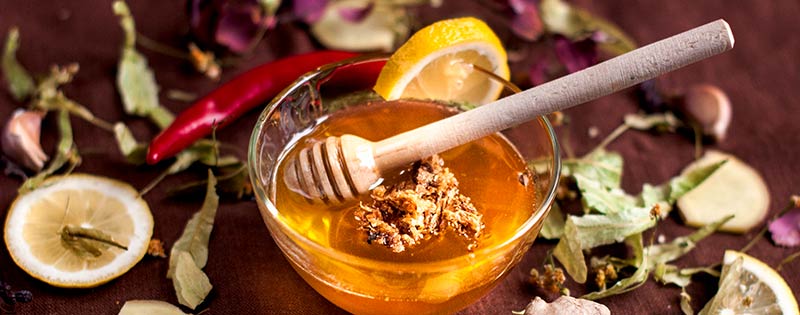by Brent Hearn •
Many of us grew up hearing our elders offering up medical advice for various ailments:
Sore throat? Drink some tea with honey!
Hiccups? Swallow a spoonful of sugar!
Burn your hand? Put some butter on it!
Leave it to Grandma to think anything she could easily lay hands on in the kitchen would solve our problems. For those keeping score, the first two remedies have some merit; the third does not. (Butter isn’t sterile, and the grease may actually hold heat in the skin when the most important thing is to cool the affected area.)
It’s completely understandable that various folk remedies would persist. After all, back in the day, they had the numbers on their side. Take any random home remedy, and there are multiple reasons one might decide it’s worth keeping around:
1. It works.
Some home remedies are helpful and have sound scientific backing. We’ll look at a few of those shortly.
2. It seems to work.
This is where it gets tricky. Remember: correlation doesn’t equate to causation. Take the butter-on-a-burn remedy, for example. It may seem to offer some relief, but that’s probably just because the butter is cold. If you took anything that’s cold from the refrigerator and smeared it on a burn, there’d likely be some temporary relief. (But seriously, don’t do that. You’re going to need that mayonnaise for your sandwich later.)
Another example? Let’s say you take a home remedy for a headache that—unbeknownst to you at the time—was caused by dehydration. If you drink enough water to alleviate the headache, maybe you remember the home remedy that did nothing and not the water that actually did bring relief, lending credence to a useless remedy.
3. You heard/read somewhere that it works.
Hey, it worked for them. Maybe it’ll work for me! But did it work for them? Maybe. Or maybe not. (See above.)
And here are the reasons—okay, it’s just a reason—one might decide a home remedy is bunk.
You tried it, and it doesn’t work.
Even this is no guarantee you won’t try it again. Maybe I did it wrong. Maybe it’s a fluke. After all, it worked for Jerry Lou!
So why offer up a random thought experiment instead of just listing some stuff proven to work? (Don’t worry—we’re getting to that.) Because one of the best ways to look out for your health is to question things that don’t make any sense.
Ineffective home remedies give the good ones a bad name, and as you’ll read below, there are good ones. And if you can get some relief for common ailments cheaply—possibly within arm’s reach—why wouldn’t you take advantage of that?
Honey
Honey can kill bacteria, relieve pain, and reduce inflammation, making it a great remedy for a sore throat. Just mix a couple of tablespoons in a glass of warm water or tea.
Lemon Juice
This one’s another good remedy for a sore throat. Lemons can help break up mucus, provide pain relief, and provide a vitamin C boost to your immune system. Just mix one teaspoon of lemon juice into a glass of warm water.
Chili Peppers/Hot Sauce
Capsaicin, the active ingredient in peppers, can help reduce inflammation and relieve pain and soreness. And believe it or not, you can even use it to help a sore throat. Though it seems counterintuitive—Why in the world would I want to pour something spicy on my inflamed gullet?—it makes the affected area hot and then numbs it.
Capsaicin can be applied topically in patch or cream form, or just add a few drops in a glass of warm water and gargle for a sore throat. (Do not go chugging hot sauce straight from the bottle; that’s asking for a whole new set of problems.)
Ginger
We’ve talked before about how ginger can spice up your life. It can also relieve nausea, bloating, and gas. And it contains antioxidant properties that can reduce wear and tear on cells.
Sugar
Consuming excess sugar gets a bad rap (and understandably so), but its reputation as a way to get rid of hiccups is well deserved. Its efficacy relates to the vagus nerve; the sugar can cause irritation in the back of the throat, which throws a wrench in the diaphragm spasms that cause hiccups.
Aloe
The gel from aloe’s leaves can be used to treat burns, psoriasis, and acne. (If you have a serious burn, you still need to see a doctor.) Though some tout the benefits of drinking juice made from the plant, there are risks and caveats associated with oral ingestion that make it worth consulting a physician, particularly if you have underlying health risks. Generally speaking:
If you’re unsure about any home remedy, consult your physician. Doing so can’t hurt, and not doing so might.
SOURCES
Bustle: 5 Natural Remedies That Don’t Actually Work
ABC Health and Well-Being: Fact Buster: Is butter good for a burn?
Penn Medicine: 6 At-Home Remedies to Ease Your Sore Throat
Johns Hopkins Medicine: Ginger Benefits
Health Digest: Can a Spoon of Sugar Help With Hiccups?
USA Today: How to get rid of hiccups: Causes and quick remedies that actually work
Reader’s Digest Canada: 30 Old-Time Home Remedies That Actually Work
Mayo Clinic: Aloe









 ▶︎
▶︎  Why is the Discount Challenge prize amount $15,024? Because that is the average “per-occurrence” fine for Medicare inducements. That’s not $15,024 per patient, that’s not per provider, that’s PER VISIT. Stinks, doesn’t it? To us, the prize amount is worth the investment if we can help our profession better understand proper discounting.
Why is the Discount Challenge prize amount $15,024? Because that is the average “per-occurrence” fine for Medicare inducements. That’s not $15,024 per patient, that’s not per provider, that’s PER VISIT. Stinks, doesn’t it? To us, the prize amount is worth the investment if we can help our profession better understand proper discounting.